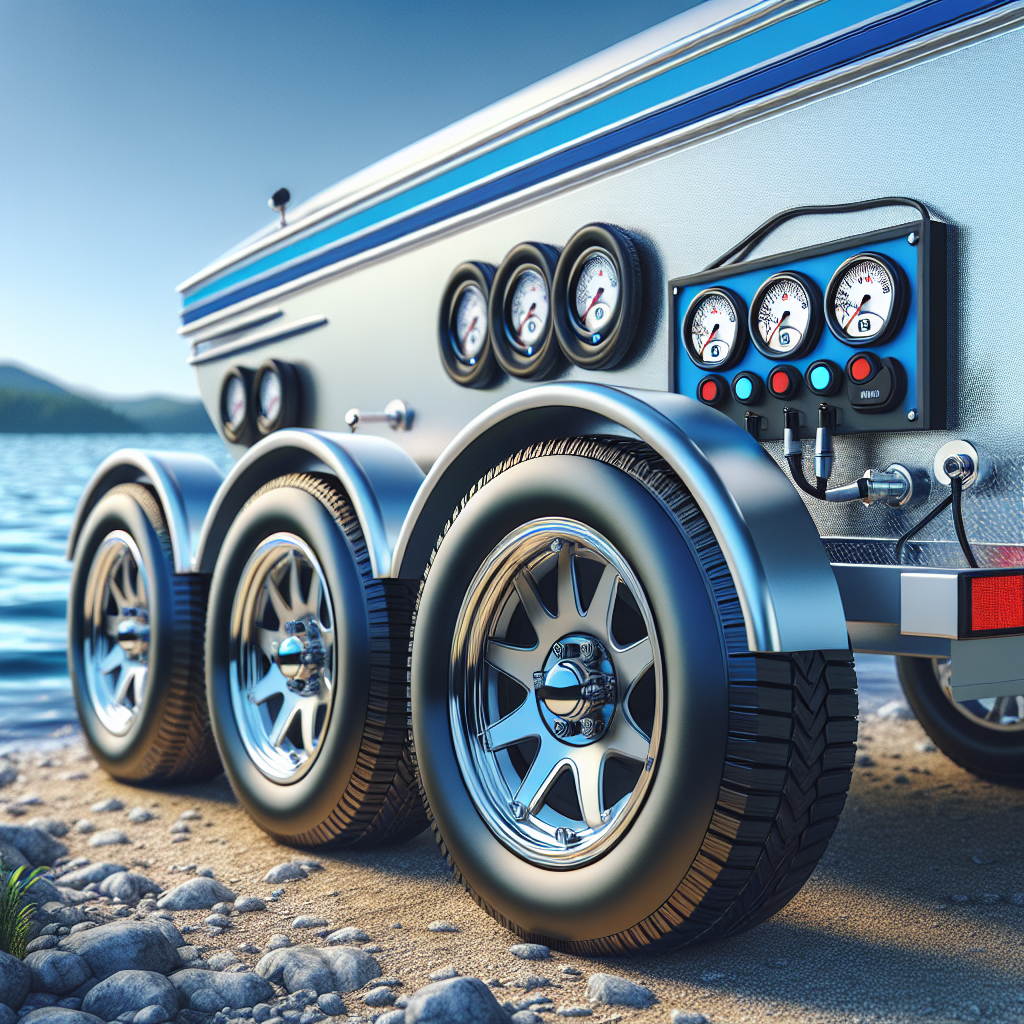When it comes to ensuring the safety and reliability of your trailer, understanding how a boat trailer tire pressure monitoring system works is crucial. These systems are designed to continuously monitor the tire pressure of your trailer’s wheels, providing real-time data that can help prevent potentially dangerous situations.
A tire pressure monitoring system (TPMS) typically consists of sensors installed on each tire that measure the air pressure and temperature. The information gathered by these sensors is transmitted to a display unit inside your vehicle, allowing you to keep an eye on the tire conditions at all times. This constant monitoring can alert you to critical changes in tire pressure, enabling you to take corrective action before a tire blowout occurs.
Some of the key benefits of implementing a TPMS include:
- Enhanced Safety: By receiving alerts for low tire pressure, you can avoid dangerous blowouts.
- Improved Fuel Efficiency: Maintaining proper tire pressure can lead to better fuel economy.
- Increased Tire Lifespan: Monitoring tire health helps in prolonging their life.
Investing in a boat trailer tire pressure monitoring system not only enhances safety but also ensures a smoother towing experience. Tow with peace of mind, knowing that TrailerWatchdog is standing guard.
Importance of Maintaining Proper Tire Pressure
Maintaining proper tire pressure is essential for any vehicle, but it holds particular significance for trailers, especially when towing boats. Tires that are either under-inflated or over-inflated can lead to a variety of issues, including diminished performance, increased wear, and even catastrophic failures.
Here are some critical reasons why keeping your tire pressure in check is vital:
- Safety Risks: Low tire pressure can cause tires to overheat, leading to blowouts. On the other hand, over-inflated tires may result in reduced traction, increasing the risk of losing control while towing.
- Fuel Efficiency: Properly inflated tires can significantly improve your vehicle's fuel economy. Under-inflation increases rolling resistance, forcing the engine to work harder and consume more fuel.
- Tire Longevity: Maintaining the correct tire pressure reduces uneven wear and prolongs the life of your tires. This means fewer replacements, saving you money in the long run.
- Enhanced Handling: Proper tire pressure improves the handling and stability of your trailer. This is especially crucial when navigating turns or responding to sudden changes in road conditions.
Ultimately, regular checks and maintenance of your trailer's tire pressure can lead to safer, more efficient towing experiences. It's not just about convenience; it's about ensuring that you and your cargo arrive at your destination safely.
Preventing Catastrophic Tire Failures on Boat Trailers

When it comes to towing a boat, the last thing you want is to experience a tire failure. Catastrophic tire failures can lead to dangerous situations, especially on busy highways or winding roads. Understanding how to prevent these failures is crucial for ensuring a safe towing experience.
One of the most effective ways to avoid tire-related issues is by implementing a reliable boat trailer tire pressure monitoring system. This system continuously tracks tire pressure and alerts you to any discrepancies before they become serious problems. Here are a few preventative measures to consider:
- Regular Inspections: Regularly check your tires for signs of wear and tear, including cracks, bulges, or loss of tread. Early detection can prevent a blowout.
- Maintaining Tire Pressure: As previously mentioned, keeping your tires at the recommended pressure is vital. Both over-inflation and under-inflation can lead to premature failure.
- Proper Load Distribution: Ensure that your boat is evenly loaded on the trailer. An unbalanced load can cause excessive strain on specific tires, leading to uneven wear and increasing the risk of failure.
- Replacement Practices: If your tires are over six years old, consider replacing them, regardless of their appearance. Tires degrade over time, even if they have sufficient tread left.
By taking these proactive steps, you can significantly reduce the likelihood of catastrophic tire failures, ensuring a safer journey for you and your boat.
Features of an Effective Tire Pressure Monitoring System

An effective boat trailer tire pressure monitoring system is essential for maintaining tire health and ensuring safe towing experiences. The right system not only alerts you to potential issues but also provides valuable data that can help you make informed decisions. Here are some key features to look for when selecting a tire pressure monitoring system:
- Real-Time Monitoring: An ideal system continuously tracks tire pressure and temperature, providing real-time updates to the driver. This allows for immediate action if any abnormalities are detected.
- Alerts and Notifications: Look for systems that offer customizable alert settings. Whether through a dedicated app or an in-cabin display, timely notifications can help you address issues before they escalate.
- Data Logging: Effective systems keep a history of tire pressure and temperature data, allowing you to analyze trends and make adjustments as necessary. This feature aids in proactive maintenance and can prolong tire life.
- Easy Installation: A user-friendly installation process is crucial. Choose a system that can be easily installed on various trailer types without the need for specialized tools or extensive modifications.
- Durability: Given the challenging environments that trailers often operate in, ensure the monitoring system is rugged and weather-resistant to withstand dirt, moisture, and temperature fluctuations.
By investing in a tire pressure monitoring system with these features, you can enhance safety, prevent tire failures, and enjoy peace of mind while towing your boat.
How to Choose the Right Monitoring System for Your Trailer

Selecting the right boat trailer tire pressure monitoring system can significantly impact your towing experience and overall safety. With a plethora of options available on the market, here are some essential considerations to help you make an informed decision:
- Compatibility: Ensure that the monitoring system is compatible with your specific trailer type and size. Some systems are designed for specific axle configurations, so it’s crucial to verify compatibility before purchasing.
- Range and Signal Strength: Look for systems that provide a strong signal range to ensure reliable communication between the sensors and the display unit. A robust system will maintain connectivity even when the trailer is at a distance from the towing vehicle.
- Ease of Use: A user-friendly interface is important for quick access to tire data. Opt for systems that offer intuitive displays and easy navigation, making it simple to monitor tire health at a glance.
- Battery Life: Consider the battery life of the sensors. Longer battery life means less frequent replacements and a more hassle-free experience. Look for systems that provide low battery alerts as well.
- Customer Support and Warranty: Good customer support can make a significant difference if you encounter issues with the system. Check for warranties or guarantees that reflect the manufacturer’s confidence in their product.
By taking these factors into account, you can choose a monitoring system that not only meets your needs but also enhances the safety and efficiency of your trailer operations.
Maximizing Safety and Efficiency with Smart Trailer Technology

Integrating smart trailer technology into your towing operations can dramatically enhance both safety and efficiency. The advancements in trailer monitoring systems, such as those offered by TrailerWatchdog, empower trailer owners with real-time data and insights that can prevent accidents and mechanical failures.
One of the primary benefits of smart trailer technology is the ability to monitor critical parameters, such as axle temperature and tire pressure. These factors are crucial for maintaining optimal tire performance and preventing blowouts, which can lead to catastrophic failures during travel. With a reliable monitoring system, you can receive alerts on any anomalies, allowing for timely interventions.
Moreover, smart trailer systems often come equipped with features that improve overall towing efficiency. For instance, they can provide data on load distribution and weight, helping you optimize your trailer setup for better fuel efficiency and handling. The integration of such technology not only enhances safety but also contributes to significant cost savings over time.
Furthermore, the data collected can be analyzed to identify patterns and trends, enabling you to make informed decisions regarding maintenance and upgrades. This proactive approach ensures that your trailer remains in top condition, ultimately prolonging its lifespan.
Tow with peace of mind, knowing that TrailerWatchdog is standing guard. Our advanced monitoring systems ensure that you are always informed about your trailer’s health, allowing you to focus on the journey ahead.








